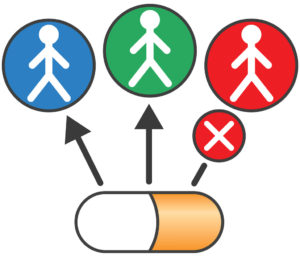
Every medication for every ailment, from headaches to heart disease, goes through clinical trials before it becomes available to patients. Clinical research is necessary to determine whether potential new drugs are effective and safe to use, and those that are get the seal of approval from the Food and Drug Administration (FDA). During a clinical trial, health care providers give the new drug to patient volunteers that ideally represent a sample of the larger treatable population. However, the underrepresentation of racial and ethnic minorities in clinical trials has historically skewed the demographics.

Why is it so important to have proper representation across all demographics? When the FDA approves a drug for a certain medical condition, it is approved for all patients with that condition. However, even for individuals with the same condition, the efficacy and side effects of certain medications may vary across demographics. Variation can occur due to socioeconomic, environmental, and genetic differences. If certain groups are underrepresented in clinical trials, then we have an incomplete picture of the particular health needs of those populations, potentially leading to inadequate treatment. For example, although white women are diagnosed more frequently with breast cancer, African-American women are more likely to die from the disease. This disparity indicates that there is an unmet need among African-Americans for effective breast cancer treatments.

Although racial and ethnic minorities make up about 30% of the U.S. population, collectively they only make up about 20% of clinical trial participants. While this is an improvement from previous years, there’s still progress to be made. Unfortunately, there are numerous barriers to increasing minority inclusion in medical research, including lack of access to healthcare and education. Additionally, there have been unethical medical practices that have targeted minority populations in the past. This includes the Tuskegee experiment, a 4 decade-long study during which African-American men were intentionally denied treatment for syphilis in favor of studying the disease. Such offenses have caused many minority communities to distrust healthcare officials. Overcoming these obstacles requires effort on the part of healthcare officials to improve communication and build connections with those communities.
Though clinical research is crucial for patients to benefit from new and more effective treatments, not all populations have benefited to the same degree. Improving representation of minorities in clinical trials is an important task that requires a change in perspective from healthcare providers and patients alike. Ultimately having diverse patient groups representative of the population will allow clinical research to yield more effective medications and improve the health of the broader population.
Peer edited by Christina Marvin.
Follow us on social media and never miss an article: